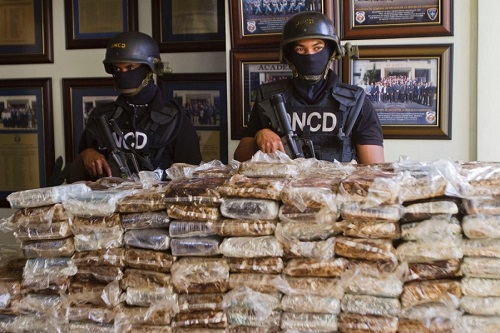AFP photo
By
Ricardo Swire
Since the Dominican Republic’s (DR) latest Attorney-General (A-G) took office in 2016 he has found himself immersed in law enforcement reality, with the complex task of removing politics from the rule of law. In his action plan the AG has to account for a spiralling level of internal security corruption and surge in national drugs trafficking. Statistics show from 2014 to 2016 the number of local interceptions indicated transnational drug trafficking syndicates value the DR as an important transit hub for consignments voyaging via the Caribbean to Puerto Rico, America and Europe.
In January 2015, Carlos Fernandez Valerio, the Former Director of DICAN, or anti-narcotics police Dirección Central Antinarcóticos, was formally charged and jailed for stealing and attempting to sell 1.2 metric tons of cocaine seized during DICAN operations. He was additionally indicted with money laundering, embezzlement and falsification of public documents. The ex-DICAN Director coordinated twenty-one corrupt officials who stole drug shipments from the state. The group re-sold to either transnational drug traffickers or domestic dealers.
In March 2015 five Venezuelan traffickers tried to move four hundred and fifty kilos of cocaine to Santo Domingo, DR by private jet. Twelve months later Puerto Rican Coast Guard officers intercepted a suspicious vessel crewed by three Venezuelans and a Colombian, one hundred and fifty miles off the coast of Romana, the DR’s seventh largest city. The quartet’s watercraft transported one thousand, one hundred kilos of cocaine. On August 16, 2016 two unidentified traffickers attempted to dock their vessel, carrying nine hundred and thirty-two kilos of cocaine, in waters off Cumayasa La Romana the DR.
Two days later a former DR Navy Vice Admiral from General Command joined the A-G’s office as national Drug Enforcement Agency boss. Together the two most senior DR internal security figures manage high percentages of rogue police officers, infiltration and collusion with criminal elements. Their action plan needs to consider that one DR Anti-Drugs Police report identified micro trafficking networks that bankroll more than US$100,000 monthly to rogue officers.
Occurrences such as the DR’s powerful crime syndicate leader El Matatan’s arrest highlight a strong local law enforcement/criminal relationship. El Matatan’s syndicate gave US$140,000 monthly to rascal San Cristobal police officers, for unhampered business operations in seven sectors of DR’s southern province in return. Three Office of National Drugs Control (DNCD) agents helped protect the criminal clique.
Another planning consideration for the Dominican Republic Attorney-General and Vice Admiral’s local DEA would be the reality of being “home” to the Caribbean’s largest drugs lab. In April 2014, when the National Drug Control Directorate discovered the underground cocaine laboratory, the facility was hidden away on prestigious property in San Cristobal managed by a Colombian. A Lebanese chemist mixed the chemicals to produce cocaine. The US Drug Enforcement Agency regards the DR as a “warehouse” for narcotics heading to America.
Intelligence data analysis suggests that Colombian traffickers chose the DR, as preferred Caribbean drug lab location, because precursor chemicals used in cocaine formulas are easier to source in Santo Domingo. The addictive stimulant’s base materials value less than finished product. Colombians incurred cost to export such raw materials and process them in the DR, just one thousand and thirteen miles away, guarantees minimum financial losses if cocaine shipments are intercepted by law enforcement.
The DR A-G and Vice Admiral’s action plan needs to prevent further infiltration, similar to the double agent who performed the role of San Francisco de Macoris’ Assistant Anti-Narcotics Police Chief. After receiving intelligence from America, Colombia, PR and Venezuela the DR’s Tactical Sensitive Investigations Section (DITIS), supported by Tactical Fast Reaction Unit and DNCD elite officers launched a special counter-narcotics operation. The DR’s senior law enforcer was detained, with three locals and two Colombians, while transporting four hundred kilos of cocaine to Santo Domingo.
The Police Major and his drug traffickers’ three SUVs were stopped next to the toll plaza on the Duarte highway, twenty-five kilometers north of Santo Domingo. One Colonel, a member of the intervening special counter-narcotics team, ripped the Major’s rank insignia from his uniform cap. Prior to arrest the Major’s trafficking network received cocaine from Colombia. In collaboration with the three other DR nationals and two Colombians the product was exported to PR and America.
Ricardo Swire
Ricardo Swire is the Principal Consultant at R-L-H Security Consultants & Business Support Services and writes on a number of important issues.



No Comments Yet!
You can be first to comment this post!